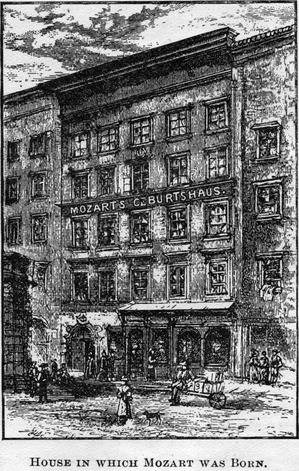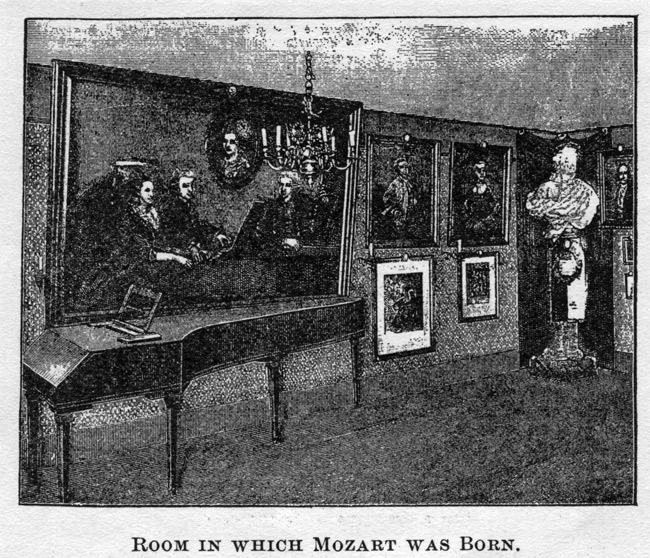The time was when history was studied by learning a mass of facts and a long array of dates, a dry chronicle of events rather than the story of men and women who lived, worked, and died, but whose works and aspirations died not with them. To-day we study the man and his deeds. With many of them there is no need for us to go to history to learn of them. Their influence is still felt. Those who labor to-day do their work on lines, in part, at least, laid down by those who worked years ago. Our libraries are full of their creations, from which we can recreate, before our mental visions, the man as once he breathed and lived. One of those characters who made history in his day, whose works still live to make us better and to influence us to high and pure endeavor, was Wolfgang Amadeus Mozart.
Ancestry.
Biographers are accustomed to inquire into the ancestry of the subject of their writings to see how far the influence of heredity may have force in explaining the characteristics of a man of genius. Mozart was the descendant of a family, which about two centuries before his birth was settled at Augsburg, as artists and mechanics, one of them having some renown as a painter. The grandfather of Mozart was a book-binder, whose youngest son, Leopold, early gave proofs of a quick intellect and remarkable purpose of character. A contemporary wrote of him: “He is not only a skilful musician, but a man of good sense and ready wit, and I have never seen a man of his profession who was at the same time so talented and of such sterling worth.” (Note the words “of his profession.”) He was a thorough musician, well educated, and an esteemed composer. His notable work was a treatise on violin-playing. Mozart’s mother was a very beautiful, good-natured woman, of rather limited education, as compared with her husband, and thoroughly devoted to her children.
Birthplace.
 Environment is also considered as a factor in the development of genius. Salzburg, the home of Leopold Mozart, is renowned for beauty. “To see it shining in the sun, with its large white façades, its flat roofs, its terraces, its church and convent cupolas, its fountains, one would take it for an Italian city.” It was, therefore, a fit cradle for one who is considered the apostle of pure beauty in music.
Environment is also considered as a factor in the development of genius. Salzburg, the home of Leopold Mozart, is renowned for beauty. “To see it shining in the sun, with its large white façades, its flat roofs, its terraces, its church and convent cupolas, its fountains, one would take it for an Italian city.” It was, therefore, a fit cradle for one who is considered the apostle of pure beauty in music.
The home of the Mozarts in Salzburg still exists, and has been made into a Museum, in which are preserved souvenirs of the composer and members of the Mozart family. The precocity of the child has been dwelt upon elsewhere in this issue. To the self-sacrificing father who gave all his time and energy to the careful education of his child the world of art owes much. And the father was competent to educate his son, grounding him in musical science, so far as known in that day, in violin- and harpsichord-playing; so that when later he came into touch with men of renown as composers, he astonished them all, and easily outmatched them by his skill in scientific composition. In natural endowment and an exquisite sense for pure melody none could equal him.
Tours in Germany, France, and England.
It was in 1762 that the first musical tour was made, Leopold Mozart taking his two children, Wolfgang and Maria Anne (Nannerl), who was less than four years the senior. Munich was the leading city visited on this trip. Later in the same year the children were taken to Vienna, and appeared before the imperial court. This visit was so successful and so great was the triumph of the boy, that his father began to plan for farther travels. Paris and London were now to be visited. This was in 1763. It was not until near the end of that year that Paris was reached, some months having been spent in concerts at various important German cities. The result was the same everywhere: Astonishment at the marvelous gifts and wonderful abilities of the child. In Paris the record is equally brilliant. But all the success in Germany and France was eclipsed by the triumph won in London, which city was reached in April, 1764. Quite a stay was made in London. During this time Mozart’s education was continued; among other lessons he received thorough instruction in singing from a celebrated Italian soprano. It was not until August 1, 1765, that England was left, to return home, visiting Paris and other cities. So much time was thus taken up, that it was not until the end of November, 1766, that Salzburg was reached. This long journey helped greatly to spread the fame of the wonder-child.
The Italian Journey.
The boy’s education was continued, and as he grew in stature, both physically and musically, the father turned his eyes toward Italy, the home of great composers and illustrious singers. He made the pretext of a visit to Vienna, and thus received leave of absence from his musical duties in the Archbishop’s chapel, and in September, 1767, the family started on a long tour, but got only as far as Vienna, where they stayed until December, 1768, when Leopold was called to Salzburg by the Archbishop. But the Italian journey was only postponed, and in 1770 we find the travelers in Italy. The success here was unbounded. Mozart proved his mastery of musical science and his maturity as a composer, and was elected a member of the Bologna Philharmonic Academy. This tour lasted until March, 1771, when they were again back at Salzburg. Toward the end of this year the Archbishop of Salzburg died, and was succeeded by one who was a man of the meanest and most tyrannical spirit, who was a sort of evil genius of Mozart, who, instead of fostering and developing the fine spirit in his charge, seemed to take delight in doing all he could to thwart his “projects and dampen his enthusiasm. The town was not congenial to one of Mozart’s temperament, and the occasional trips he made were gladly welcomed as breaks in the monotonous life of several years. Such were visits to Munich, Augsburg, and Mannheim, the latter city having the best orchestra in Europe. The stay in the latter city was momentous to him. Here he came into contact with the Weber family, one of whose members afterward became his wife. From Mannheim, Mozart and his mother went to Paris, arriving there in March, 1778. Four months later the mother died, and thus the trip was broken up. Mozart started for home, which he reached in January, 1779, and here he stayed for a year and a half. The tyranny of the Archbishop became more and more insupportable, and finally, in June, 1781, the bondage was severed, and Mozart was free, but with a career to make for himself.
His Career in Vienna.
The emperor was interested in his behalf by friends among the nobility, and as a result of this patronage the opera “The Escape from the Seraglio” was written and performed in July, 1782, with distinguished success. Shortly afterward Mozart married Constance Weber. The father was disappointed with his choice, but gave a reluctant consent. Thus began a life of privation, of struggle with debt, illness, and disease. Neither of the pair was thoughtful and provident, and the result is easily foreseen. Yet they were happy and devoted to each other.
The remainder of his life Mozart spent in Vienna, working as composer, giving concerts, and teaching. At various times he was brought into contact with famous musicians of the day, but he was generally acknowledged as the superior of them all. His piano-playing was greatly admired, and he was unexcelled in extempore playing. On different occasions he was known to seat himself at the instrument and play for hours. Many thought that it was on such occasions that he revealed the deepest side of his nature, and that then his music took its boldest and loftiest flights.
In regard to Mozart’s financial troubles it must be said that, while he earned considerable, he was careless, extravagant, and generous to a fault. While he was a favorite in aristocratic circles and received many presents, still they were not so valuable to him as would have been the case had they been in the form of money. His musical successes were brilliant, but the pecuniary returns were by no means commensurate.

Mozart was always somewhat delicate as to health, and in childhood had more than a child’s share of diseases. The irregular life, privations, worries with rivals, struggles with intriguing competitors, consuming anxieties over money-affairs, and lack of necessities for an invalid wife rapidly broke down his constitution, so that it is not strange that his life, though so full of brilliant promise, should have ended so abruptly. There have appeared stories of excesses and dissipations in Mozart’s life that are now considered as, in the main, unfounded.
The story of the death of the composer and its fantastical association with the writing of “The Requiem” is familiar to all, and need not be retold here. It was December 5, 1791, that the end came. There was little or no money in the house. In the midst of a raging storm the body was taken to the cemetery and placed in a common vault. No stone was possible over his resting-place, and to-day no man knows his grave.
Personality.
“In person, Mozart was small, thin, and pale; with a large head and a large nose; eyes well shaped, but short-sighted, although he never wore spectacles; he had plenty of fine hair, of which he was proud, and he was vain of his hands and feet; he dressed carefully and elegantly, and was fond of jewelry. He rode horseback and took great pleasure in playing billiards, bowls, and in dancing. His prevailing characteristics were amiability, generosity, and a warm appreciation of all that was good and noble in music or mankind. He was full of fun, and he dearly loved a joke; he delighted in doggerel rhymes.” With musicians he was friendly, and rarely spoke ill of others. In his youth he showed ability in arithmetic; his talent for the acquisition of languages was remarkable, and he was acquainted with the French, Italian, and English tongues; he was also familiar with Latin; the works of the standard authors he had read, and he even indulged himself in some light forms of versification; he drew with skill and taste, and was a most charming letter-writer.
In regard to his religious connections we have the following, taken from a letter to his father: “As death, strictly speaking, is the true end and aim of our lives, I have for the last two years made myself so well acquainted with this true, best friend of mankind that his image no longer terrifies, but calms and consoles me. And I thank God for giving me the opportunity of learning to look upon death as the key that unlocks the gate of true bliss.”



